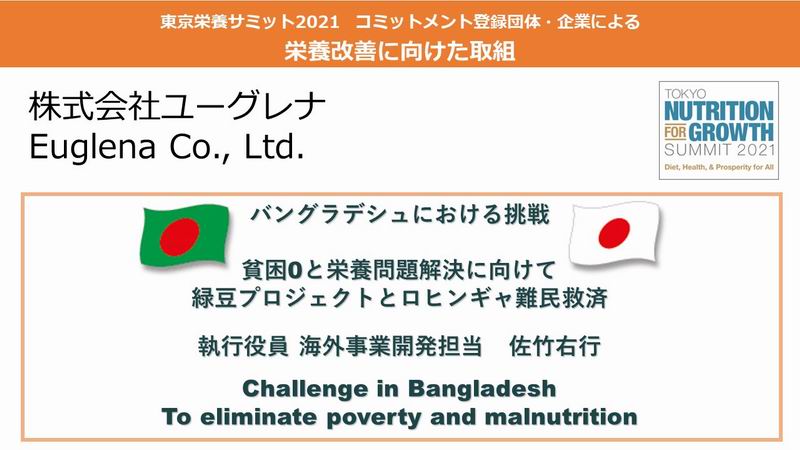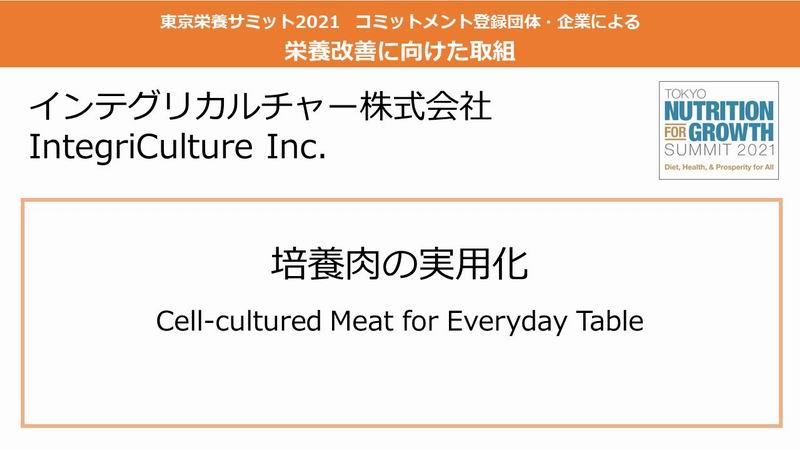Video Archive of TOKYO NUTRITION FOR GROWTH SUMMIT 2021


Please click ”Japanese website” button to see Japanese site.
Japanese website
7 Thematic Sessions
DAY1(December 7th)
DAY2(December 8th)
DAY1(December 7th)
Session-1:Trends in transformation into sustainable food systems after the United Nations Food Systems Summit
-Summary of the United Nations Food Systems Summit and the ideal food systems that Japan is aiming for based on the "MeaDRI"
-Summary of the United Nations Food Systems Summit and the ideal food systems that Japan is aiming for based on the "MeaDRI"
After the UN Food System Summit, a major trend of food systems transformation toward achieving the SDGs has been formed. In this session, we summarized the discussions at the UN FSS and the Japan’s commitments. In particular, we confirmed that all stakeholders should understand the necessity of efforts towards “food sustainability” and create a momentum to work together with shared goals, working toward the potential of various innovations as the key to "achieving both productivity improvement and sustainability", and solving the long-term challenges of agriculture, forestry, fisheries, and food industry, which our Strategy for Sustainable Food Systems aims to realize.
Session-2 : Aiming for a sustainable solution to food and nutrition issues
- "Think food locally, connect wisdom globally"
- "Think food locally, connect wisdom globally"
There is no one-size-fits-all solution to the diverse challenges faced by all countries and regions, including developing and emerging economies. On the other hand, the world does not have enough resources (people, goods, money) to tackle each issue individually. In order to realize the most effective local production for local consumption through global wisdom sharing, we need to change the world through "Innovative Partnership" with the active participation of non-traditional actors who have been involved in food and nutrition. In this session, with the message of "Food is Local, Wisdom is Global”, we discussed how the perspective of "Nutrition by All" is essential to realize "Nutrition for All" in a sustainable manner.
Session-3 : Countermeasures and Support for the Double Burden of Malnutrition
-Roundtable discussion with the global community
-Roundtable discussion with the global community
In order to achieve environmentally friendly and sustainable food procurement, it is necessary to harmonize the global food system and self-sustaining ecosystem within each region. In addition, to solve the problem of "double burden of malnutrition" that is rapidly increasing in the world, especially in developing and emerging countries, it is necessary to improve eating habits by promoting healthy diets. In this session, we shared the latest efforts of the global community to improve nutrition around the world, and discussed how social systems should be to realize these efforts and how multi-stakeholder partnerships should be developed for Japanese companies to actively contribute to solving nutritional issues.
DAY2(December 8th)
Session-4 : Promoting Shokuiku for "No One Left Behind"
-Population approach to improve dietary behavior
-Population approach to improve dietary behavior
The recent COVID-19 pandemic has further worsened the hunger problem. Even in countries and regions where hunger and poverty have almost ended, a new nutritional challenge, “the double burden of malnutrition”, which means low-nutrition and overnutrition existing simultaneously, has spread. In this session, we focused on the diverse values of food, not just the discussion of individual nutrients regarding the new way of "food education" in the "New Normal" era. Based on Japan's efforts, we considered the comprehensive efforts of the local community to realize a healthy diet without leaving behind those who are vulnerable in society, that is, “the fundamental population approach" in food education.
Session-5 : Japan's knowledge and recommendations to solve nutritional issues
-Approaches to food culture and eating habits and corporate contributions toward the realization of "nutrition improvement according to individual circumstances"
-Approaches to food culture and eating habits and corporate contributions toward the realization of "nutrition improvement according to individual circumstances"
Japan's food culture has been developed and passed down from generation to generation, nurtured by its rich climate. In recent years, in order to overcome nutritional issues associated with changes in dietary habits, we have made various efforts along with the development of nutritional science, to achieve the current healthy and longevity society. Nowadays, the health value and sustainable value of traditional Japanese food are being reaffirmed. In this session, we shared Japan's experience and knowledge about the value of “food culture”, including scientific approaches, and confirm that it is necessary to build healthy and sustainable dietary habits by utilizing the unique food culture in all regions.
Session-6 : Necessity of building a social system to solve nutritional issues
-A new social system for better nutrition realized through innovation, taking "Japan's Experiences" into the future.
-A new social system for better nutrition realized through innovation, taking "Japan's Experiences" into the future.
The Nutrition Japan Public-Private Platform (NJPPP), which was established in the wake of the London N4G Summit, has been promoting efforts to improve nutrition in developing countries, such as improving workplace nutrition. In addition, the Public-Private Council for Promoting Global Food Value Chain, which promotes the overseas development of Japan's food industry, has been discussing how to build partnerships with local communities for sustainable development. In this session, based on the past achievements and experiences, we discussed how the Japanese business sector should contribute to solving nutrition issues, perspectives for appropriately addressing regional issues, organizing various approaches, and the necessity of building sustainable partnerships.
Session-7 : Message from the Japanese food industry to the world
-To achieve both better nutrition and sustainable development, companies that have made their N4G commitments will give presentations on their actions.
-To achieve both better nutrition and sustainable development, companies that have made their N4G commitments will give presentations on their actions.
In this session, the presidents and CEOs of the four Japanese companies presented their own Tokyo N4G Summit’s commitments. In addition, those presidents and CEOs shared their knowledge on the four points that we should focus on in our actions to implement the theme 2 of Tokyo N4G Summit, "Food: Building food systems that promote healthy diets and nutrition": (1) Food Systems Transformation, (2) Promotion of Food-related innovation in Business, (3) Promotion of Nutrition-related Behavior Change in Consumers, and (4) Support for Nutrition Improvement in Developing and Emerging Countries. Finally, as a summary of the side event, the Ministry of Agriculture, Forestry and Fisheries presented an "Action Plan," specific action plans for implementing N4G Compact by Japan’s food stakeholder.
Presentation Session
Stakeholders (Commitment Registration)
Click the thumbnail to externally link to our YouTube channel (only Japanese).
◇
- 1.The Ajinomoto Foundation : The actions based on "beneficiary insights"
- 2.Hirosaki University Center of Innovation : “QOL Health Checkup Program” for Literacy Gain
- 3.World Food Programme : Ensuring food systems deliver healthy diets for all people within planetary boundaries
- 4.Euglena Co., Ltd. : Challenge in Bangladesh
- 5.Ajinomoto Co., Inc. : “Help extend the healthy life expectancy of 1 billion people”
- 6.Kao Corporation : Spreading of the evidence-based workplace nutrition improvement programs : "Smart WASHOKU"
- 7.DSM Japan K.K. : 1.Closing the micronutrient gap, 2.Support smallholder farmer livelihoods, 3.Improved workforce nutrition
- 8.NH Foods Ltd. : Unleash new potentials for protein ~Ensure a stable supply and a variety of food choices for protein~
- 9.HAYASHIBARA CO., LTD. : Unique Biotech Brings Wellbeing to All
- 10.KAGOME CO., LTD. : Improvement of malnutrition by vegetable
- 11.NISSIN FOODS HOLDINGS : Pursuit of Future Food –Sustainability & Well-being
- 12.IntegriCulture : Cell-cultured Meat for Everyday Table
This is the order of the presentations on the day.
Nutrition Japan Public Private Platform (NJPPP)Report on the activities of the study group on the Commitment-making for the N4G
Japanese food, dietary balance, food diversity
Efforts to reduce salt
Promote protein intake
Healthy management and workplace nutrition improvement
Hygiene and nutrition measures in an emergency
Retail nutrition improvement business
Efforts to reduce salt
Promote protein intake
Healthy management and workplace nutrition improvement
Hygiene and nutrition measures in an emergency
Retail nutrition improvement business
1.The Ajinomoto Foundation
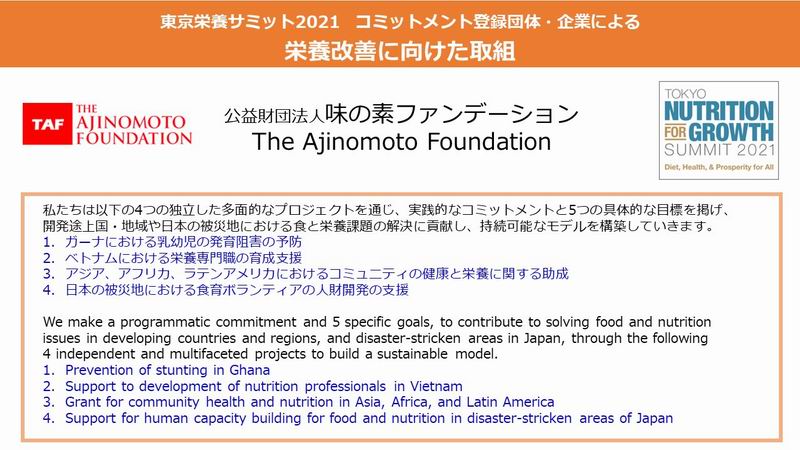
We make a programmatic commitment and 5 specific goals, to contribute to solving food and nutrition issues in developing countries and regions, and disaster-stricken areas in Japan, through the following 4 independent and multifaceted projects to build a sustainable model.
1.Prevention of stunting in Ghana
2.Support to development of nutrition professionals in Vietnam
3.Grant for community health and nutrition in Asia, Africa, and Latin America
4.Support for human capacity building for food and nutrition in disaster-stricken areas of Japan
1.Prevention of stunting in Ghana
2.Support to development of nutrition professionals in Vietnam
3.Grant for community health and nutrition in Asia, Africa, and Latin America
4.Support for human capacity building for food and nutrition in disaster-stricken areas of Japan
2.Hirosaki University Center of Innovation
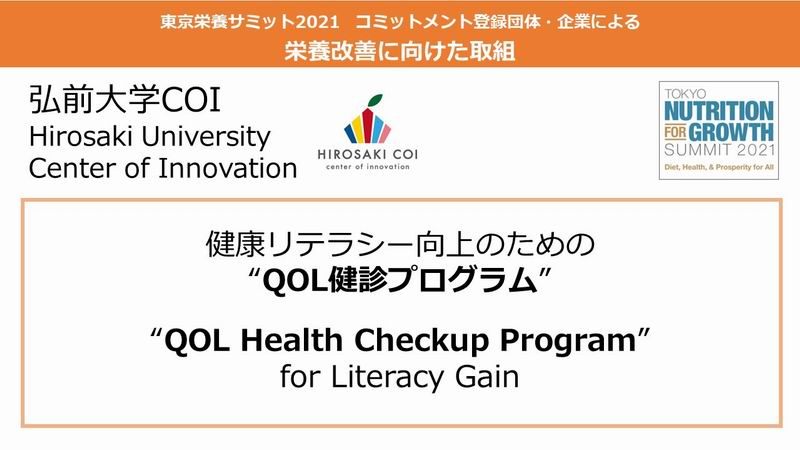
To contribute to the reduction of premature deaths from noncommunicable diseases in Japan and the world, we will establish a highly effective health literacy improvement program, "QOL Health Checkup Program", based on the findings of the cohort studies. The program visualizes each person’s health issues, gives motivation, literacy for nutrition or health, and supports for healthy lifestyles in the real life. We will provide the program for 1 million people worldwide by 2030, to help reduce disparities in health and health literacy among the world.
3.World Food Programme
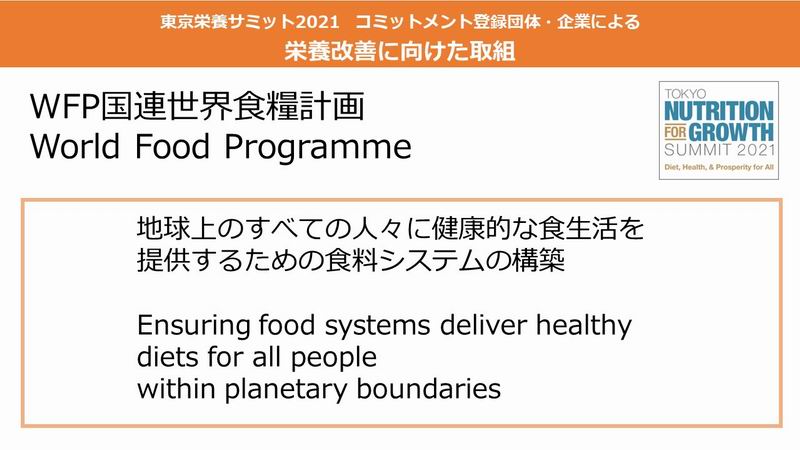
• Work with governments, supply chain actors and local communities across food systems to bring healthy, nutritious, and culturally appropriate food within reach of everyone
• Especially assist those living in the most fragile settings, where conflict, disasters, and the impact of climate change threaten progress against malnutrition.
• Especially assist those living in the most fragile settings, where conflict, disasters, and the impact of climate change threaten progress against malnutrition.
5.Ajinomoto Co., Inc.
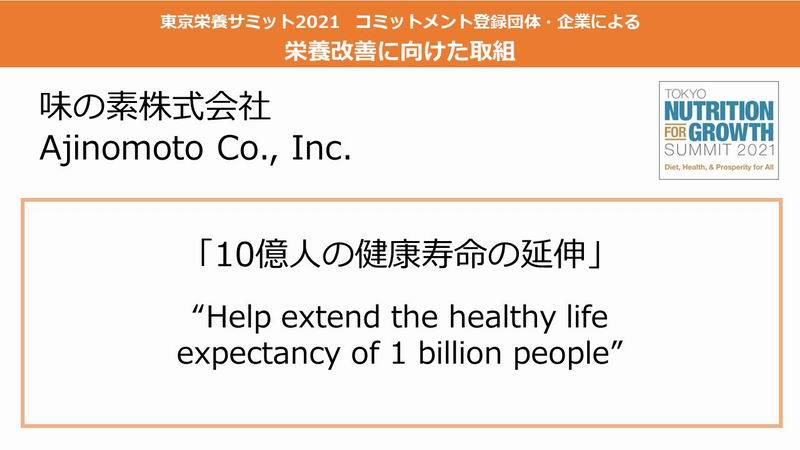
By 2030, we will help extend the healthy life expectancy of one billion people by increasing the current reach to 700 million consumers and providing products and information that support consumers in enjoying nutritious and delicious foods with Nutrition Without Compromise as basic policy on our approach to nutrition.
6.Kao Corporation
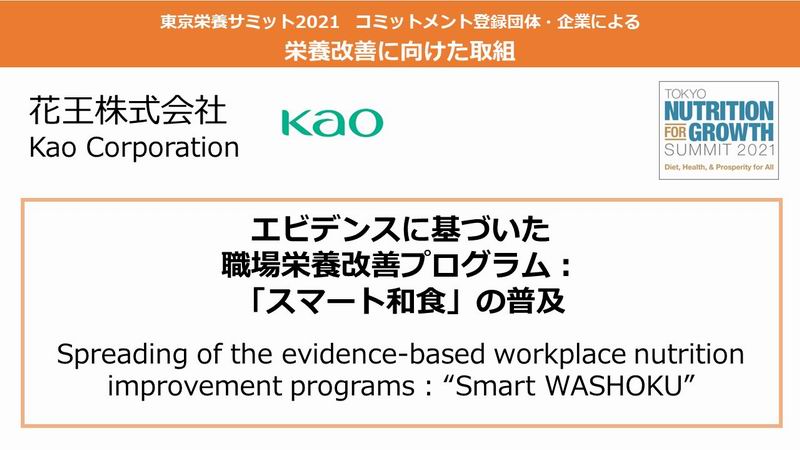
Kao Corporation will contribute the reduction of premature deaths by non-communicable diseases using the findings from its own research activities in nutrition. As part of that, by 2025, we will provide the following workplace nutrition improvement programs to workplaces that cover 200,000 people annually (including 50,000 Kao-group employees and family members and 150,000 others) and promote Health and Productivity Management and Workplace Nutrition.
7.DSM Japan K.K.
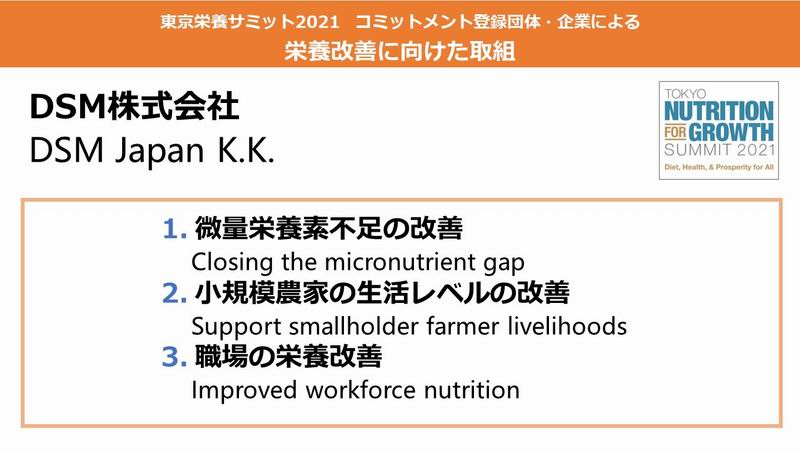
1.We commit to helping to fill the current nutrient gap of 800 million vulnerable people by 2030
2.Together with our partners, supporting the livelihoods of 500,000 smallholder farmers across value chains by 2030
3.As a company focused on supporting good health thru nutrition, we ensure access to good nutritional information and increased access to healthy nutrition for all our global employees, following the guidance of the GAIN/CGF Workforce Nutrition alliance score card
2.Together with our partners, supporting the livelihoods of 500,000 smallholder farmers across value chains by 2030
3.As a company focused on supporting good health thru nutrition, we ensure access to good nutritional information and increased access to healthy nutrition for all our global employees, following the guidance of the GAIN/CGF Workforce Nutrition alliance score card
8.NH Foods Ltd.
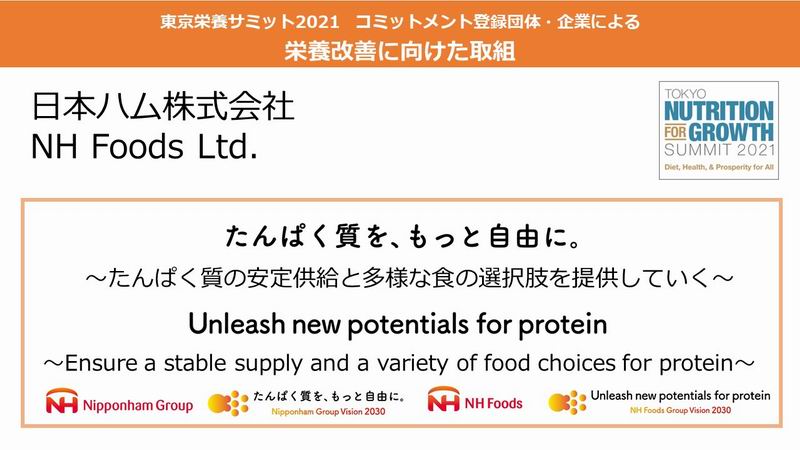
[1]Food allergies initiatives
[2]Increasing options for protein intake
[3]Develop and release products onto the market that support
[2]Increasing options for protein intake
[3]Develop and release products onto the market that support
9.HAYASHIBARA CO., LTD.
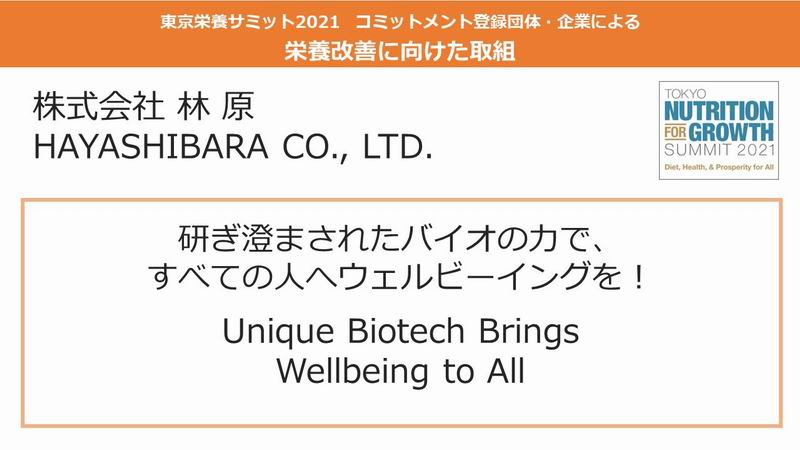
By 2030, Hayashibara Co., Ltd. will contribute to promote safe, sustainable and healthy diets that support people and planetary health by utilizing the unique functions of our food ingredients with stakeholders.
10.KAGOME CO., LTD.
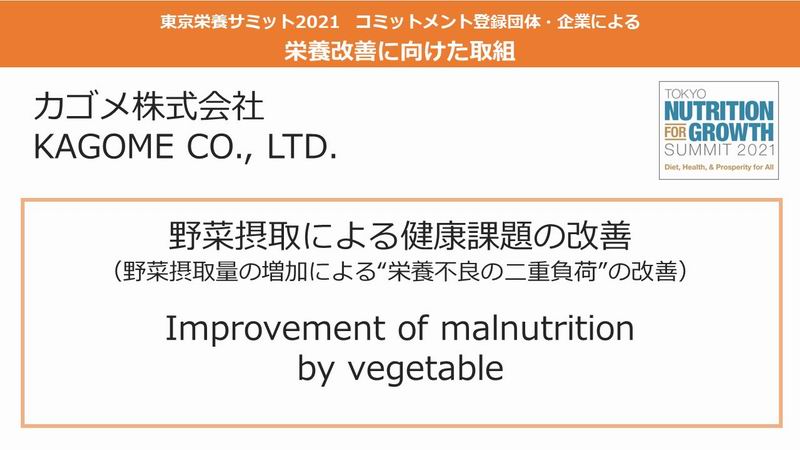
KAGOME is contributing to the resolution of global nutritional issues by actively promoting stakeholder cooperation and open innovation and by implementing the following business activities.
11.NISSIN FOODS HOLDINGS
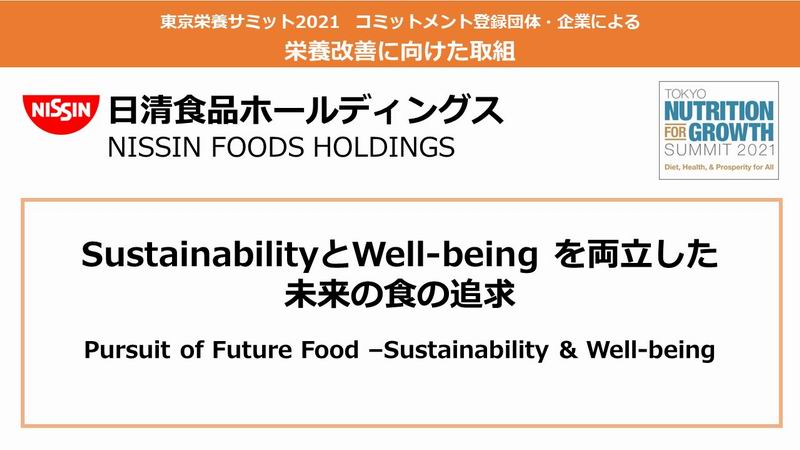
<Commitment>
(1) Wellness Products
(2) Food Allergen Tests
(3) Meat Alternatives
(4) Food Loss and Waste
(1) Wellness Products
(2) Food Allergen Tests
(3) Meat Alternatives
(4) Food Loss and Waste
Presentation Session
Stakeholders
Click the thumbnail to externally link to our YouTube channel (only Japanese).
- 1.Health Information Consortium, Keio Research Institute at SFC : Promoting, via collaboration among industry, academia, government, and the public, an ESD-related dietary education campaign using ICT
- 2.Obstetrics and Gynecology TATEDEBARI SATO HOSPITAL : A nutritional education campaign based on medical, community, and government collaboration to improve the nutrition of pregnant women and young women
- 3.International Life Sciences Institute Japan(ILSI Japan) : Aiming to develop projects based on the latest and sound science
- 4.Japan International Research Center for Agricultural Sciences (JIRCAS) : Together for our food and planetary health
- 5.International Medical Volunteers Japan Heart : Nutrition improvement by hospital diet in Cambodia
- 6.Tokyo University of Agriculture : Nutrition improvement through Agrodiversity in Africa
- 7.Japanese Standards Association : Stable meal provision by developing International Standard for emergency food
- 8.National Agriculture and Food Research Organization (NARO) : Accomplishment of sustainable food supply, nutritional improvement and SDGs through the realization of Society 5.0 in agriculture and food industry
- 9.Iga Vegetable Farm Corp. : 【Beyond the Divide】 Food value chain bridging across Local & Global
- 10.ecologgie Inc. : Well-being for the earth and life
- 11.Cookpad Inc. : Promote awareness of food issues and behavior change among consumers through cooking
- 12.Food and Agriculture Organization of the United Nations (FAO) Liaison Office in Japan : Awareness raising and network building on better production, better nutrition, better environment and better life
- 13.KURADASHI Co.,Ltd. : Reducing food loss and waste and promoting social support by using food sharing site “KURADASHI”.
- 14.Japan Conservation Engineers & Co., Ltd : No Sustainable Agriculture, No Sustainable Food Systems
- 15.Chibo Holdings Co., Ltd. : Menu development: This menu will improve nutrition and health by using the characteristics of Okonomiyaki.
- 16.NIPPN Corporation : Provision of product and information aimed at extending healthy life expectancy
- 17.Happy&Life88,LLC. : For making a healthy body Popularization of Japanese food and sweets
- 18.Mirai-Zou Co., Ltd. : To promote “Digital Agriculture”
- 19.YUKASHIKADO, Inc. : We promote personalized nutritional improvement using VITANOTE, a nutrition test kit.
- 20.BOSAI SPACE FULFILLMENT PROJECT(BSFP) : Drive the future with the intelligence of BOSAI and SPACE
- 21.Maruha Nichiro Corporation : Providing the health value of marine products with excellent nutrition and functionality
- 22.Toshima School Health Association : Promote of Nutritional Behavior Change in Children through health education after bone density measurement
This is the order of the presentations on the day.
1.Health Information Consortium, Keio Research Institute at SFC
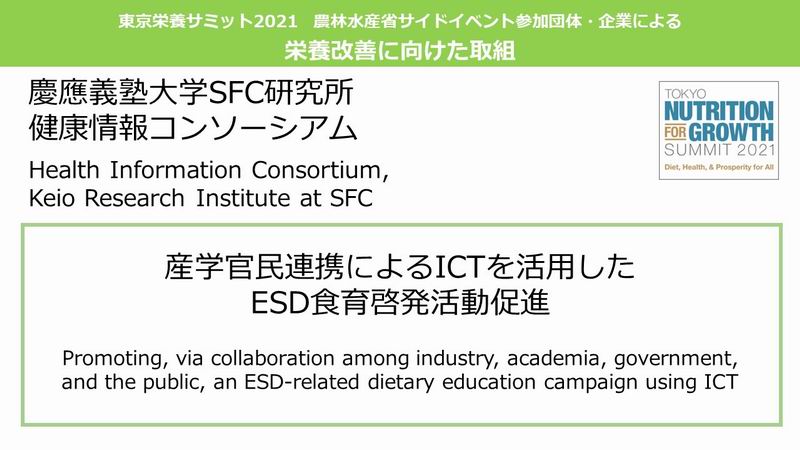
Prior to 2030, the Health Information Consortium, Keio Research Institute at SFC will, via collaboration among industry, academia, government, and the public, conduct an Education for Sustainable Development (ESD)-related dietary education campaign using ICT to depict nutritional status, develop a dietary education program, and work to improve the nutrition of young women and children.
2.Obstetrics and Gynecology TATEDEBARI SATO HOSPITAL
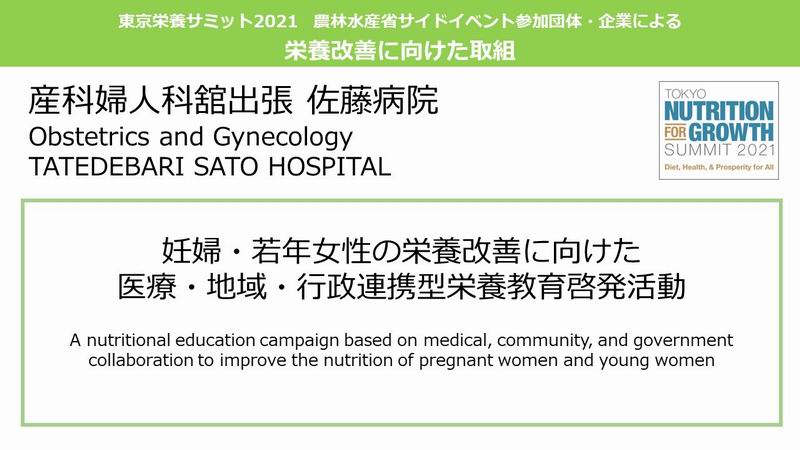
In order to prevent low body weight and undernutrition in pregnant women and young women, Obstetrics and Gynecology TATEDEBARI SATO HOSPITAL will examine mainly gynecology and obstetrics models of nutritional education based on government and community collaboration and help to improve the nutrition of pregnant women and young women and to produce healthy future generations by 2030.
3.International Life Sciences Institute Japan(ILSI Japan)
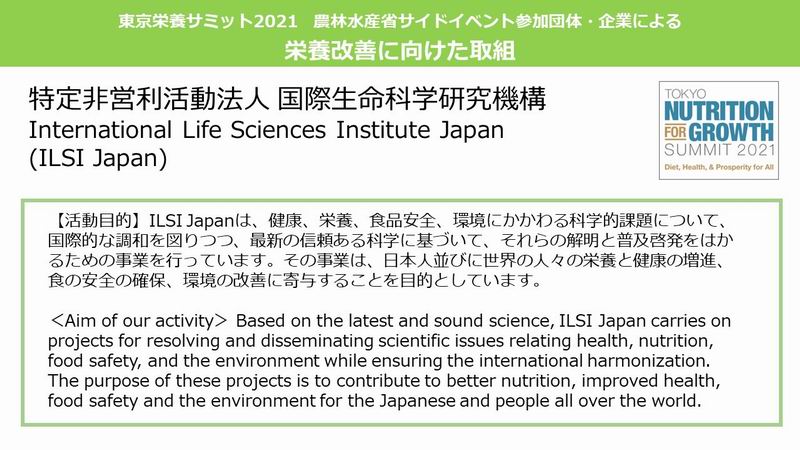
<Aim of our activity>
Based on the latest and sound science, ILSI Japan carries on projects for resolving and disseminating scientific issues relating health, nutrition, food safety, and the environment while ensuring the international harmonization. The purpose of these projects is to contribute to better nutrition, improved health, food safety and the environment for the Japanese and people all over the world.
Based on the latest and sound science, ILSI Japan carries on projects for resolving and disseminating scientific issues relating health, nutrition, food safety, and the environment while ensuring the international harmonization. The purpose of these projects is to contribute to better nutrition, improved health, food safety and the environment for the Japanese and people all over the world.
4.Japan International Research Center for Agricultural Sciences (JIRCAS)
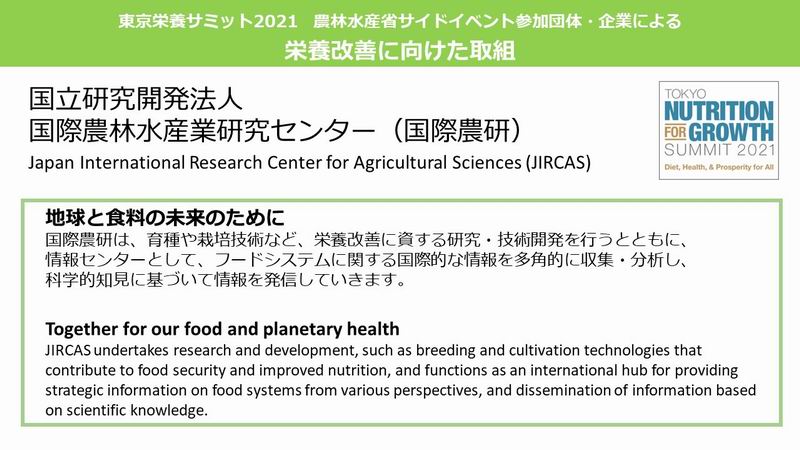
JIRCAS undertakes research and development, such as breeding and cultivation technologies that contribute to food security and improved nutrition, and functions as an international hub for providing strategic information on food systems from various perspectives, and dissemination of information based on scientific knowledge.
5.International Medical Volunteers Japan Heart
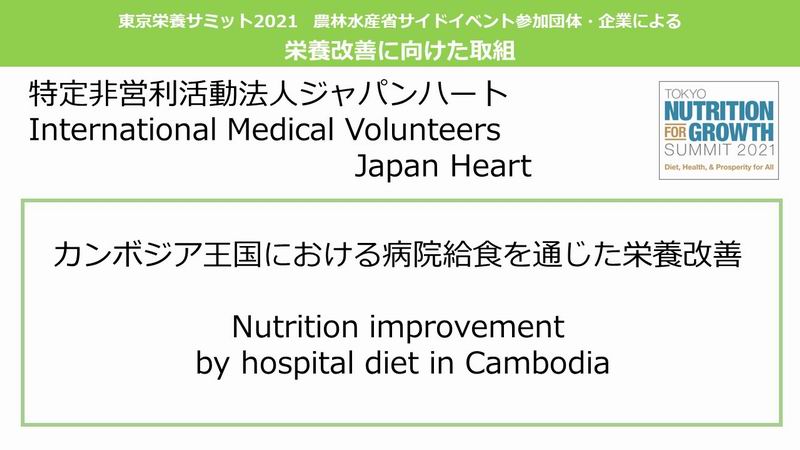
<action>
1.Supporting patient treatment by serving well-balanced hospital food which is customized according to each patient condition under hygiene control
2.Conducting nutrition education in local communities regularly to promote well-balanced diet and improve nutritional status of communities with low nutritional conscious
1.Supporting patient treatment by serving well-balanced hospital food which is customized according to each patient condition under hygiene control
2.Conducting nutrition education in local communities regularly to promote well-balanced diet and improve nutritional status of communities with low nutritional conscious
6.Tokyo University of Agriculture
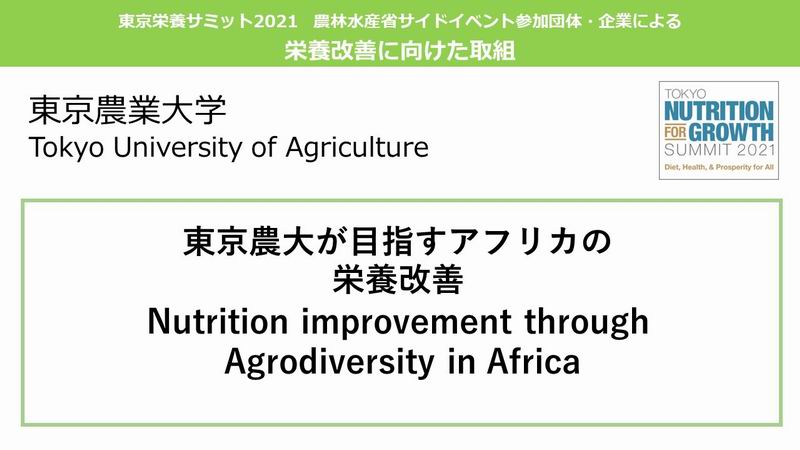
[1]Develop a new ICT system tool for better decision-making in nutrition interventions.
[2]Promote nutritional improvement in African regions in cooperation with domestic and international organizations
[3]Fostering next-generation leaders who will contribute to the improvement of food and nutrition in Africa.
[4]Promote nutrition and food security through Agrodiversity
[2]Promote nutritional improvement in African regions in cooperation with domestic and international organizations
[3]Fostering next-generation leaders who will contribute to the improvement of food and nutrition in Africa.
[4]Promote nutrition and food security through Agrodiversity
7.Japanese Standards Association
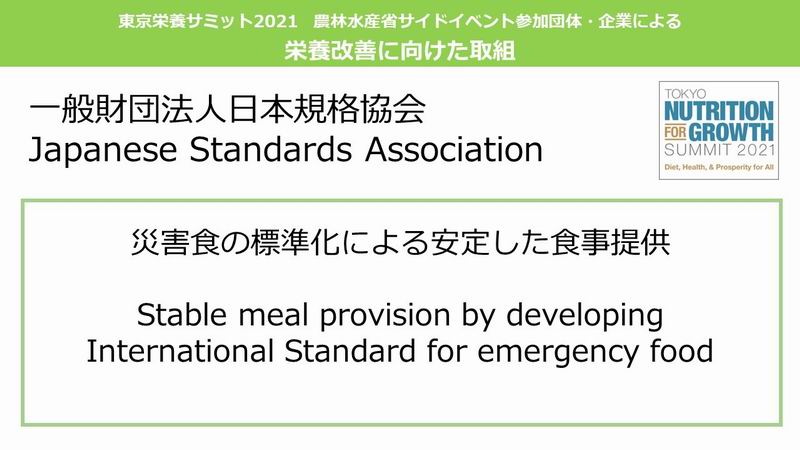
We will reduce the number of people with food difficulty by developing ISO standard for emergency foods.
8.National Agriculture and Food Research Organization (NARO)
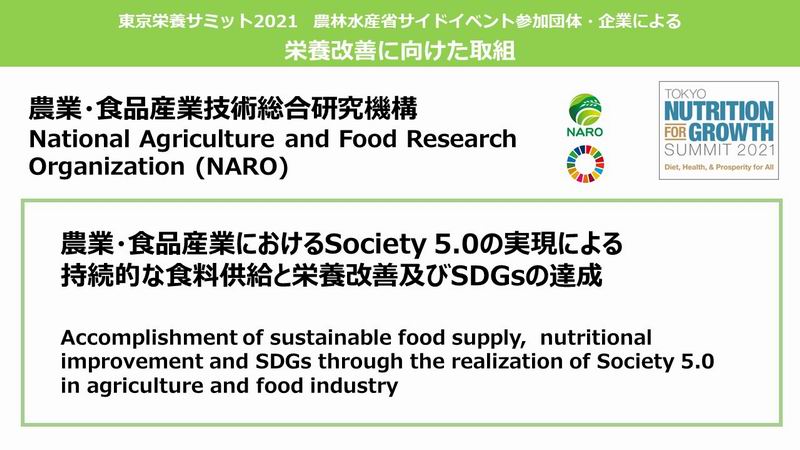
(1)Realization of the Strategy for Sustainable Food System, MeaDRI, and Globalizing Technologies
(2)Development of functional foods and creation of personalized healthcare foods
(2)Development of functional foods and creation of personalized healthcare foods
9.Iga Vegetable Farm Corp.
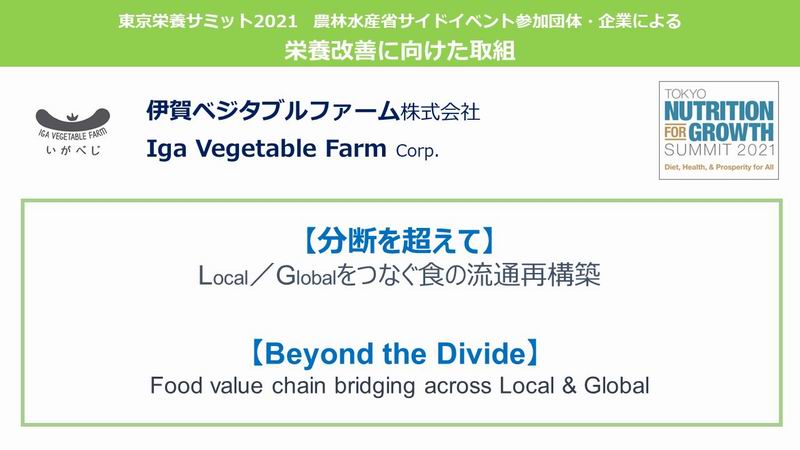
[1]Scientific Knowledge Database for Organic Food Value Chain
[2]Infrastructure for Information sharing to support local FVC
[3]Sharing Knowledge for Local FVC in Developing Countries
[2]Infrastructure for Information sharing to support local FVC
[3]Sharing Knowledge for Local FVC in Developing Countries
10.ecologgie Inc.
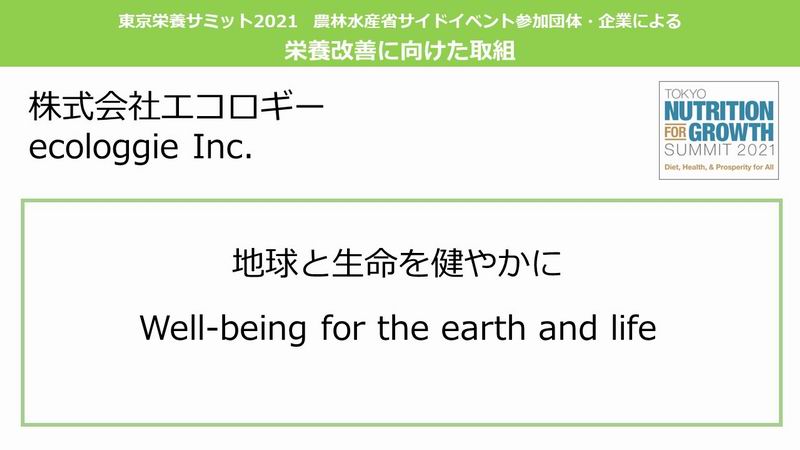
1.Create Eco-Protein
2.Improve Maternal and child nutrition by Unused Resources
3.Enrich Cambodian Farmer’s Livelihood
2.Improve Maternal and child nutrition by Unused Resources
3.Enrich Cambodian Farmer’s Livelihood
11.Cookpad Inc.
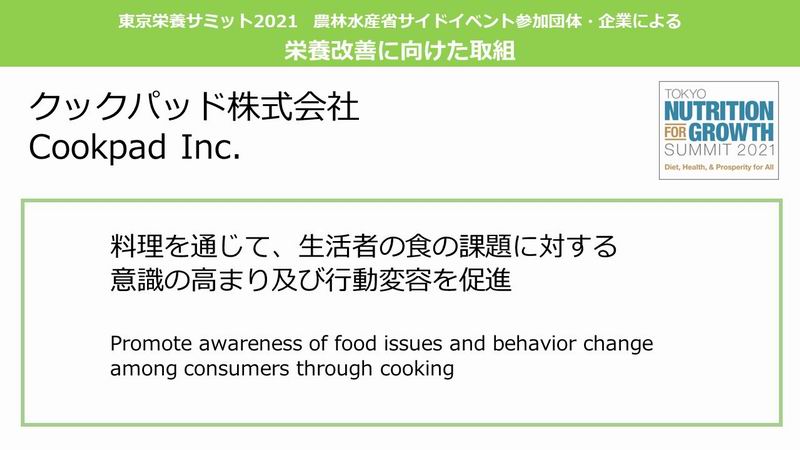
Cookpad Inc. will contribute to the healthy and sustainable food system, especially to the "Transformation of the food system," "Promotion of innovation in food-related industries," and "Promotion of behavioral change in nutrition among individuals," by increasing the number of consumers who are highly aware on food related issues in the world and take actions through cooking.
12.Food and Agriculture Organization of the United Nations (FAO) Liaison Office in Japan
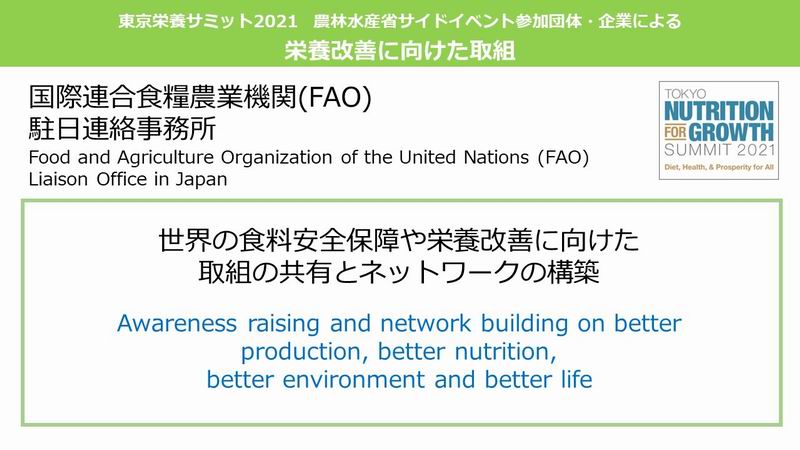
Strengthen awareness raising in Japan on food security and better nutrition at the global level
Establish a network with local governments for global knowledge sharing
Establish a network with local governments for global knowledge sharing
13.KURADASHI Co.,Ltd.
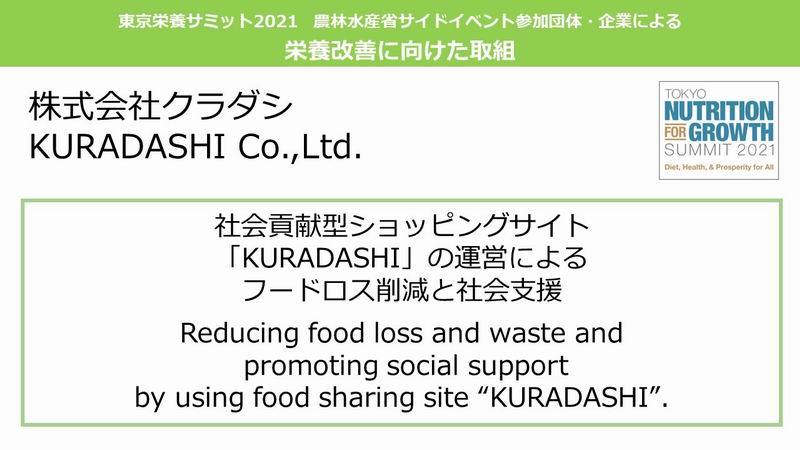
[1]Reducing food loss and waste by 50% by 2030 by using food sharing shopping site “KURADASHI”.
[2]Continuously supporting food banks and organizations tackling social issues.
[3]Realizing regional revitalization and reducing loss of unharvested primary commodities through internship program that dispatches university students to local farmers who are suffering from labor shortages due to the declining population.
[2]Continuously supporting food banks and organizations tackling social issues.
[3]Realizing regional revitalization and reducing loss of unharvested primary commodities through internship program that dispatches university students to local farmers who are suffering from labor shortages due to the declining population.
14.Japan Conservation Engineers & Co., Ltd
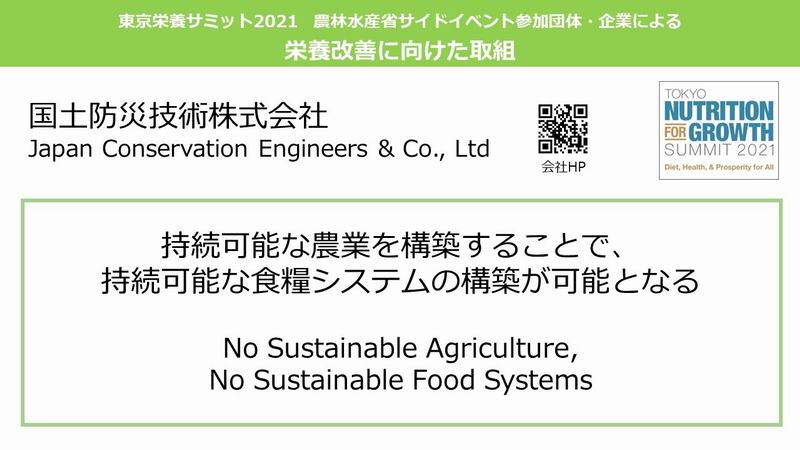
Our company have developed “Fujimin”, an organic agricultural material containing fulvic acid, which is made from domestic forest resources.
Our company contribute to the following goals of the 「Measures for achievement of Decarbonization and Resilience with Innovation(MeaDRI)」formulated by the MAFF
Increase in organic farming
Reduction in chemical fertilizer use
Our company contribute to the following goals of the 「Measures for achievement of Decarbonization and Resilience with Innovation(MeaDRI)」formulated by the MAFF
Increase in organic farming
Reduction in chemical fertilizer use
15.Chibo Holdings Co., Ltd.
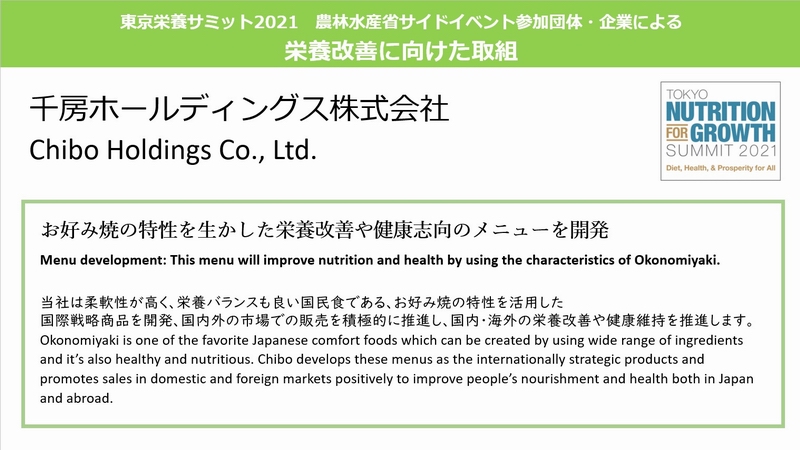
Okonomiyaki is one of the favorite Japanese comfort foods which can be created by using wide range of ingredients and it’s also healthy and nutritious. Chibo develops these menus as the internationally strategic products and promotes sales in domestic and foreign markets positively to improve people’s nourishment and health both in Japan and abroad.
16.NIPPN Corporation
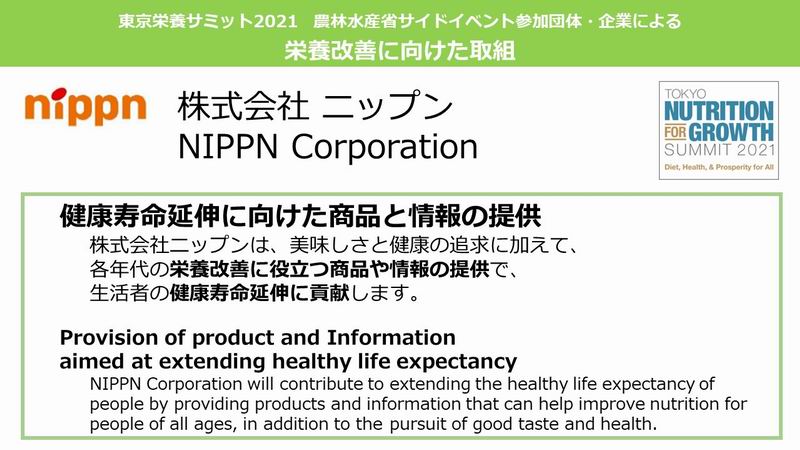
NIPPN Corporation will contribute to extending the healthy life expectancy of people by providing products and information that can help improve nutrition for people of all ages, in addition to the pursuit of good taste and health.
17.Happy&Life88,LLC.
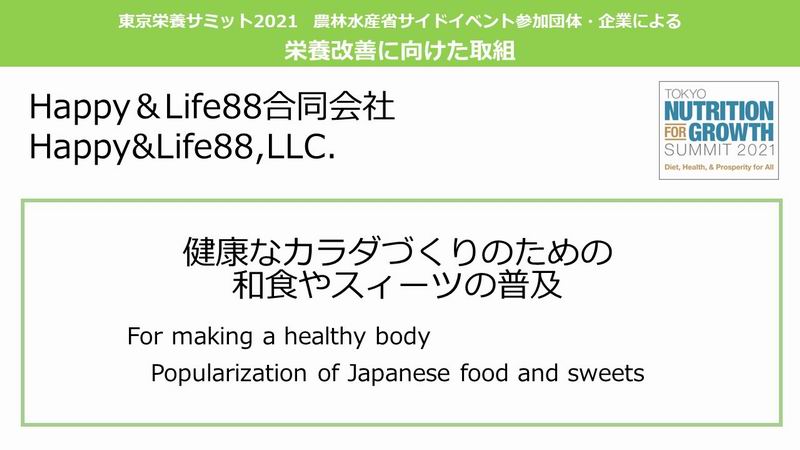
Vegan food by Happy&Life88(Japanese food and sweets (plant base)), we will work on improving various illnesses and disorders and creating a healthy body.
18.Mirai-Zou Co., Ltd.
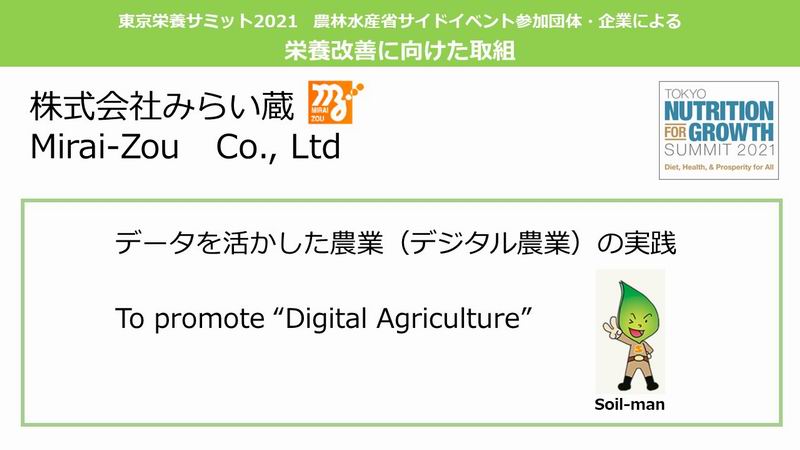
The company has been advancing digitalization of soil diagnostics and compounding fertilizers based on diagnostics since we developed “Soil-man System” in 2014. We have got good results by compounding fertilizers based on data. We can reduce waste of fertilizer, grow productivity and reduce defects. Hereafter, we will improve the system to provide detailed assistance to different soils which vary regionally. It is crucial to promote organic agriculture which is recent national policy.
19.YUKASHIKADO, Inc.
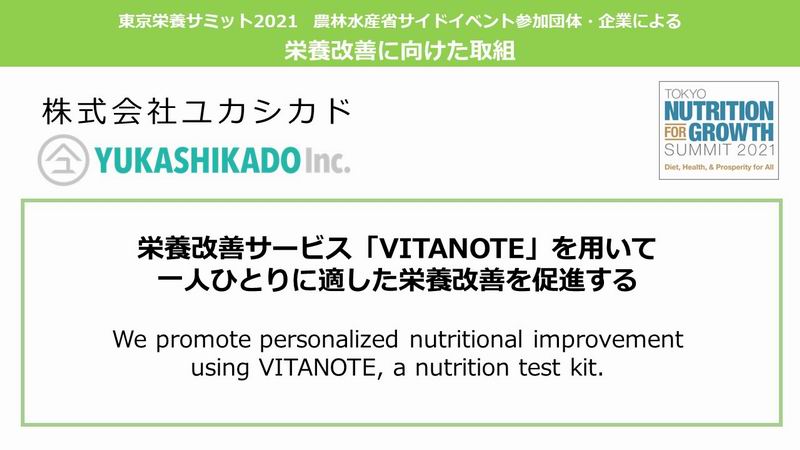
[1]We will provide VitaNote to 100 million people around the world by 2030.
[2]We will create opportunities for 1,000 dietitians and other nutritionists and work to foster awareness of nutritional improvement.
[3]By 2030, we will provide services to 10 million children in developing and emerging countries.
[2]We will create opportunities for 1,000 dietitians and other nutritionists and work to foster awareness of nutritional improvement.
[3]By 2030, we will provide services to 10 million children in developing and emerging countries.
20.BOSAI SPACE FULFILLMENT PROJECT(BSFP)
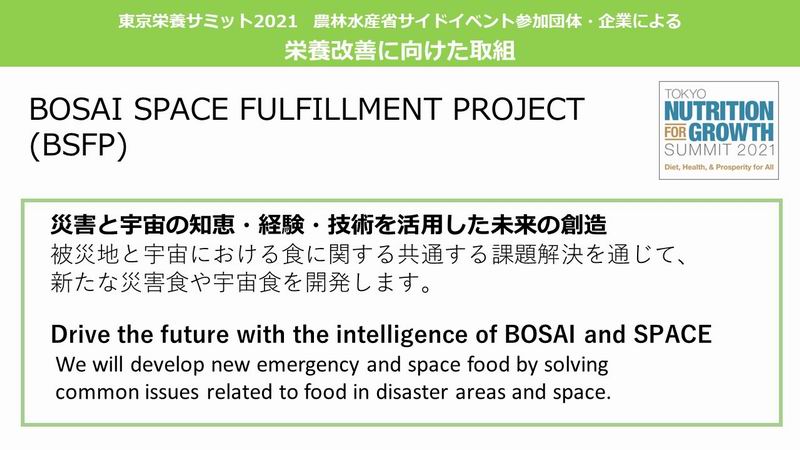
We will develop new emergency and space food by solving common issues related to food in disaster areas and space.
21.Maruha Nichiro Corporation
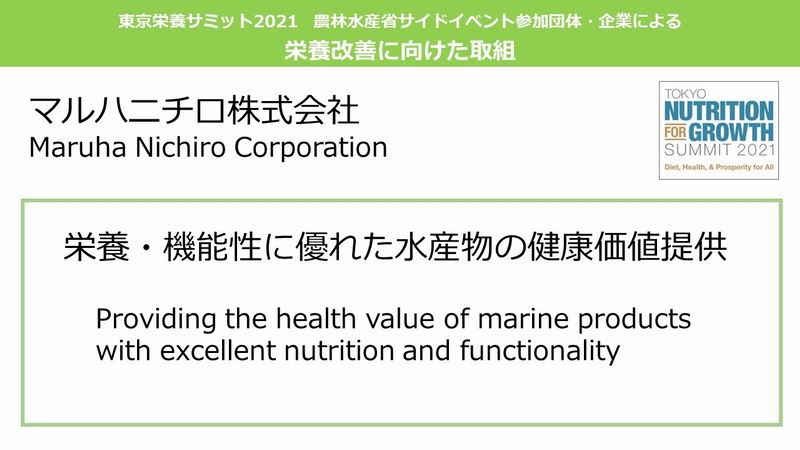
Action
Maruha Nichiro will promote the research, development and commercialization of food products that contribute to the extension of nutritional status and healthy life expectancy by 2030 through the stable provision of delicious marine products with added nutrition and functionality.
1)Provision of stable and delicious marine products, and processed foods for patients with dysphagia
2)Providing health value through proteins and lipids with excellent nutritional and functional properties
Maruha Nichiro will promote the research, development and commercialization of food products that contribute to the extension of nutritional status and healthy life expectancy by 2030 through the stable provision of delicious marine products with added nutrition and functionality.
1)Provision of stable and delicious marine products, and processed foods for patients with dysphagia
2)Providing health value through proteins and lipids with excellent nutritional and functional properties
22.Toshima School Health Association
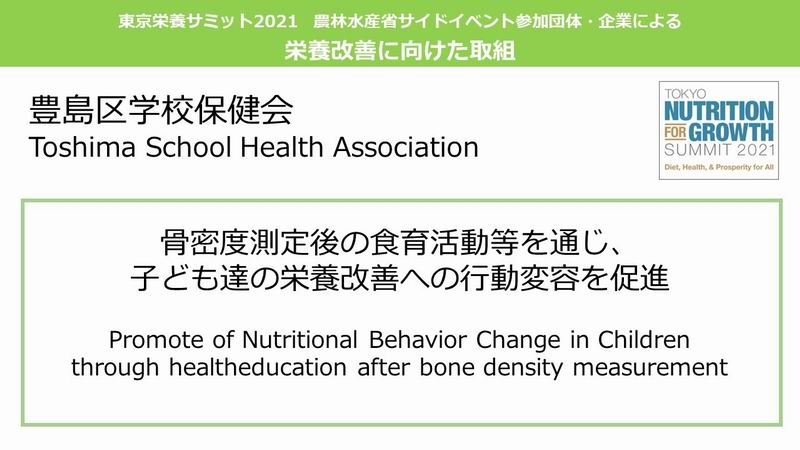
[1]For prevent osteoporosis , it is essential for nutritious especially calcium for adolescence get peakbone mass from recent medical studies.
[2]Promote of Nutritional Behavior Change in Children through healtheducation(collaboration with various partners, schooldoctors, nutritiousteachers) after bone density measurement
[3]Contributing to the health of the Children around the world by providing a special project to improve Nutritional Behavior Change in Children with data for 12years.In collaboration with various partners, countries we have developed a nutritional Children support which would be acceptable, accessible and affordable for local people.
[2]Promote of Nutritional Behavior Change in Children through healtheducation(collaboration with various partners, schooldoctors, nutritiousteachers) after bone density measurement
[3]Contributing to the health of the Children around the world by providing a special project to improve Nutritional Behavior Change in Children with data for 12years.In collaboration with various partners, countries we have developed a nutritional Children support which would be acceptable, accessible and affordable for local people.






